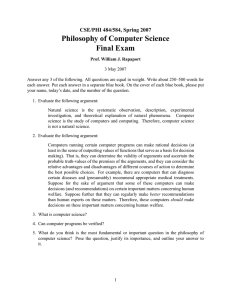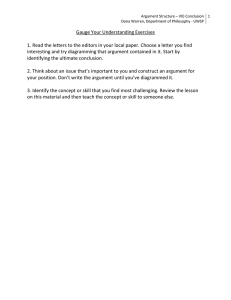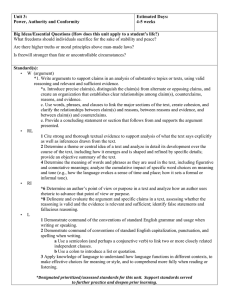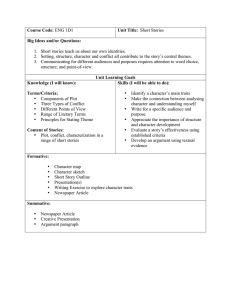Unit 4: Estimated Days: Philosophy 6 weeks
advertisement
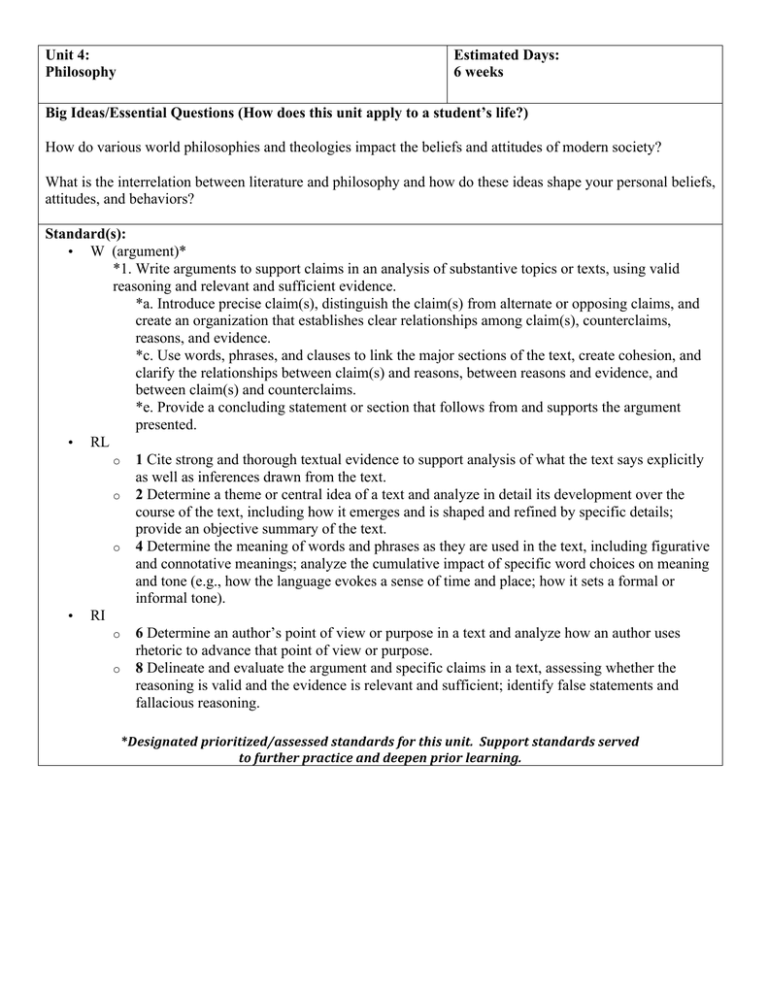
Unit 4: Philosophy Estimated Days: 6 weeks Big Ideas/Essential Questions (How does this unit apply to a student’s life?) How do various world philosophies and theologies impact the beliefs and attitudes of modern society? What is the interrelation between literature and philosophy and how do these ideas shape your personal beliefs, attitudes, and behaviors? Standard(s): • W (argument)* *1. Write arguments to support claims in an analysis of substantive topics or texts, using valid reasoning and relevant and sufficient evidence. *a. Introduce precise claim(s), distinguish the claim(s) from alternate or opposing claims, and create an organization that establishes clear relationships among claim(s), counterclaims, reasons, and evidence. *c. Use words, phrases, and clauses to link the major sections of the text, create cohesion, and clarify the relationships between claim(s) and reasons, between reasons and evidence, and between claim(s) and counterclaims. *e. Provide a concluding statement or section that follows from and supports the argument presented. • RL o 1 Cite strong and thorough textual evidence to support analysis of what the text says explicitly as well as inferences drawn from the text. o 2 Determine a theme or central idea of a text and analyze in detail its development over the course of the text, including how it emerges and is shaped and refined by specific details; provide an objective summary of the text. o 4 Determine the meaning of words and phrases as they are used in the text, including figurative and connotative meanings; analyze the cumulative impact of specific word choices on meaning and tone (e.g., how the language evokes a sense of time and place; how it sets a formal or informal tone). • RI o 6 Determine an author’s point of view or purpose in a text and analyze how an author uses rhetoric to advance that point of view or purpose. o 8 Delineate and evaluate the argument and specific claims in a text, assessing whether the reasoning is valid and the evidence is relevant and sufficient; identify false statements and fallacious reasoning. *Designated prioritized/assessed standards for this unit. Support standards served to further practice and deepen prior learning. Content (students need to know): Skills (students need to do): Theme/Central idea Writing: Point of view/Perspective Respond logically to the prompt Argument Develop a clear and relevant controlling idea Claim Organize information according to an argument essay outline Evidence Interpretation Provide specific textual evidence to support claims Inferences Use appropriate and varied transitions Rhetorical devices (Extension of previous unit of study) Use precise and domain specific vocabulary Genres Use standard conventions correctly Reading: Bloom’s Level (must match summative assessment) Evaluating (Judge, Choose, Justify) Understanding (Explain, Interpret, Outline) Applying (Examine) Analyzing (Analyze, Distinguish, Compare, Identify, Explain) Remembering/Analyzing (Identify, Describe) Create (Compose) Identify/analyze theme using textual evidence (i.e. word choice, plot, characterization, point of view, etc.) Analyze divergent perspectives Identify/analyze logical fallacies Evaluate the argument and specific claims in a text Identify/analyze textual evidence that supports author’s views Summative Performance Task (evidence of learning): Argumentative writing prompt: Select one of the philosophies from Collection 13 of the literature book (pages 903-947) and justify how this philosophy most aligns or conflicts with your current worldview. Support your claim with evidence from at least two different sources. OPTIONAL - Formative Assessments (evidence of progress) • Reading Sample “The Lowest Animal” p. 457 and “The Man in the Water” p. 475 o What is the author’s central argument? Use evidence from the text to support your argument. o What does the author what the reader to think about humanity? Use evidence from the text to support your argument. o What rhetorical devices does the author use to convince the reader of his or her argument’s validity? o Compare and contrast ____’s and ____’s views on humanity. • Quick writes following the reading of selected sources from Collection 13, Literature Book o Topics could include: Do you agree or disagree with the perspective the author presents? Support your position by making a claim. What assumptions do you believe the author makes about ____________? Identify the most powerful line or phrase from today’s reading. What implication does this idea have in our society today? Other teacher/PLC generated topics. What if students don’t get it? • Provide mini-lessons to target skill deficiencies following quick writes. • Utilize administration/other staff for writing conferences with students. • Repeat guided practice as needed. Resources: Suggested Texts: • • Collection 13 (pages 903-947) Sources of Wisdom (Philosophy and Theology) Various other literature that matches the appropriate level and purpose Resources Needed: Primer on philosophy/religion (short, class sets) What if students do get it? • Provide a mini-lesson to address the need for a counter-argument. • Differentiate texts to match level and purpose.

